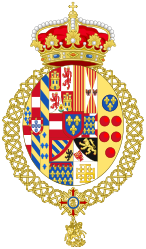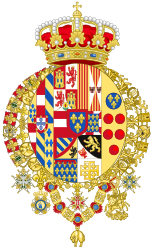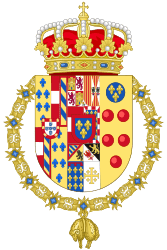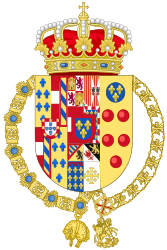Infante Carlos, Duke of Calabria facts for kids
Quick facts for kids Infante Carlos |
|||||
|---|---|---|---|---|---|
| Duke of Calabria (more) | |||||
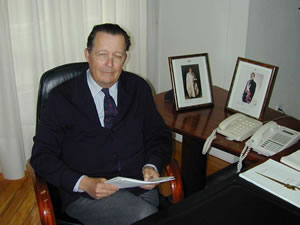
Photographed in his studio in a Teba jacket
|
|||||
| Head of the House of Bourbon-Two Sicilies (disputed) | |||||
| Tenure | 3 February 1964 – 5 October 2015 | ||||
| Predecessor | Infante Alfonso | ||||
| Successor | Prince Pedro | ||||
| Born | 16 January 1938 Lausanne, Switzerland |
||||
| Died | 5 October 2015 (aged 77) Retuerta del Bullaque, Spain |
||||
| Burial | El Escorial, Spain | ||||
| Spouse |
Princess Anne of Orléans
(m. 1965) |
||||
| Issue | Princess Cristina Princess María Prince Pedro, Duke of Calabria Princess Inés Princess Victoria |
||||
|
|||||
| House | Bourbon-Two Sicilies | ||||
| Father | Infante Alfonso, Duke of Calabria | ||||
| Mother | Princess Alicia of Bourbon-Parma | ||||
| Religion | Roman Catholic | ||||
| Royal styles of Infante Carlos of Spain, Duke of Calabria |
|
|---|---|
 |
|
| Reference style | His Royal Highness |
| Spoken style | Your Royal Highness |
Carlos Maria Alfonso Marcelo de Borbón-Dos Sicilias y de Borbón-Parma (born January 16, 1938 – died October 5, 2015) was a Spanish prince. He was known as an Infante of Spain. This title is given to children of the King and Queen, or to other close relatives.
Carlos was a cousin to King Juan Carlos I and King Felipe VI. He was also a claimant to lead the royal family that once ruled the Kingdom of the Two Sicilies. This kingdom became part of Italy in 1861.
Contents
Early Life and Education
Carlos was born in Lausanne, Switzerland, on January 16, 1938. His parents were Infante Alfonso de Borbón-Dos Sicilias y de Borbón and Princess Alicia of Bourbon-Parma. He was their only son.
His family was living in exile from Spain at the time. Carlos grew up alongside his cousin, Juan Carlos. Juan Carlos later became the King of Spain.
School Days with the Future King
Carlos and Juan Carlos were very close. They went to school together in Switzerland and later in Spain. Don Juan de Borbón, Juan Carlos's father, chose Carlos to be his son's roommate.
They attended a special boarding school. This school was set up by Don Juan and Spain's leader, Francisco Franco. It was located at a country house called Las Jarillas, near Madrid.
In November 1948, Carlos and Juan Carlos moved into the school. They studied with other young noblemen. They learned about law at the University of Madrid. They remained good friends throughout their lives.
Family Life
Carlos lived in Madrid with his family. They owned large farms in Toledo and Ciudad Real. He also had investments in big companies like Repsol and Telefonica.
Marriage to Princess Anne
Carlos met Princess Anne of Orléans in April 1961. They met in Madrid at his sister's wedding. They saw each other again at the wedding of Juan Carlos and Princess Sophia in Athens in 1962.
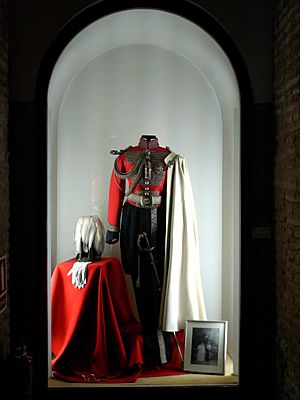
Their fathers had a disagreement about royal family claims. This caused a delay in their marriage plans. However, Carlos and Anne were determined to be together.
Carlos's father passed away in 1964. With patience, Carlos finally got permission to marry Anne. They had a civil ceremony on May 11, 1965, in Louveciennes. The next day, they had a Catholic wedding at the Chapelle royale de Dreux.
Children of Carlos and Anne
Carlos and Anne had five children:
- Princess Cristina of Bourbon-Two Sicilies (born March 15, 1966 in Madrid). She married Pedro López-Quesada y Fernández-Urrutia. They have two children:
- Victoria López-Quesada y Borbón-Dos Sicilias (born January 17, 1997)
- Pedro López-Quesada y Bórbon-Dos Sicilias (born December 1, 2003)
- Princess María of Bourbon-Two Sicilies (born April 5, 1967 in Madrid). She married Archduke Simeon of Austria. They have five children.
- Prince Pedro of Bourbon-Two Sicilies, Duke of Calabria (born October 16, 1968 in Madrid). He married Sofia Landaluce y Melgarejo. They have seven children.
- Princess Inès María of Bourbon-Two Sicilies (born April 20, 1971 in Madrid). She married Nobile Michele Carrelli Palombi dei Marchesi di Raiano. They have three children:
- Nobile Teresa Carrelli Palombi dei Marchesi di Raiano (born December 6, 2003)
- Nobile Blanca Carrelli Palombi dei Marchesi di Raiano (born December 11, 2005)
- Nobile Arturo Carrelli Palombi dei Marchesi di Raiano (born 2014)
- Princess Victoria of Bourbon-Two Sicilies (born May 24, 1976 in Madrid). She married Markos Nomikos. They have four children:
- Anastasios Nomikos (born May 27, 2005)
- Ana Nomikos (born August 11, 2006)
- Carlos Nomikos (born September 22, 2008)
- Simeón Nomikos (born December 20, 2012)
Career and Interests
After his engagement was broken, Carlos traveled for a year. He worked at banks in the Americas. These included Chase Manhattan in New York.
After he married, Carlos and Anne lived in Madrid. Carlos became an expert in financial law and banking. He also managed his family's large farms in Spain after his father died in 1964.
Royal Claims and Legacy
Infante Carlos was one of two people who claimed to be the head of the Royal House of the Kingdom of the Two Sicilies. The other claimant was his second cousin, Prince Carlo of Bourbon-Two Sicilies.
Carlos was the oldest male descendant of Ferdinand I of the Two Sicilies. Ferdinand was named the "first born legitimate heir" by his father, King Charles III of Spain.
Titles and Special Honors
Royal Titles
King Juan Carlos I gave Prince Carlos the title of Infante of Spain. This happened on December 16, 1994. It recognized his family's historical connection to the Spanish Crown.
Special Honors and Roles
Carlos received many honors during his life. He was a Dean Knight with Collar of the Order of the Golden Fleece in Spain. He was also a Chancellor Knight with Collar of the Royal Military Order of Alcántara.
He held many important leadership roles. He was President of the Spanish Foundation of the United World College. He also led the Patronato of the Naval Museum. Carlos was President of the Spanish Confederation of Foundations. He also led the Foundation for the Protection of Nature.
Carlos passed away on October 5, 2015. He was 77 years old. He died at his family estate, "La Toledana," in Retuerta del Bullaque.
Arms
- Heraldry of Infante Carlos, Duke of Calabria
See also
 In Spanish: Carlos de Borbón-Dos Sicilias para niños
In Spanish: Carlos de Borbón-Dos Sicilias para niños
 | Dorothy Vaughan |
 | Charles Henry Turner |
 | Hildrus Poindexter |
 | Henry Cecil McBay |


